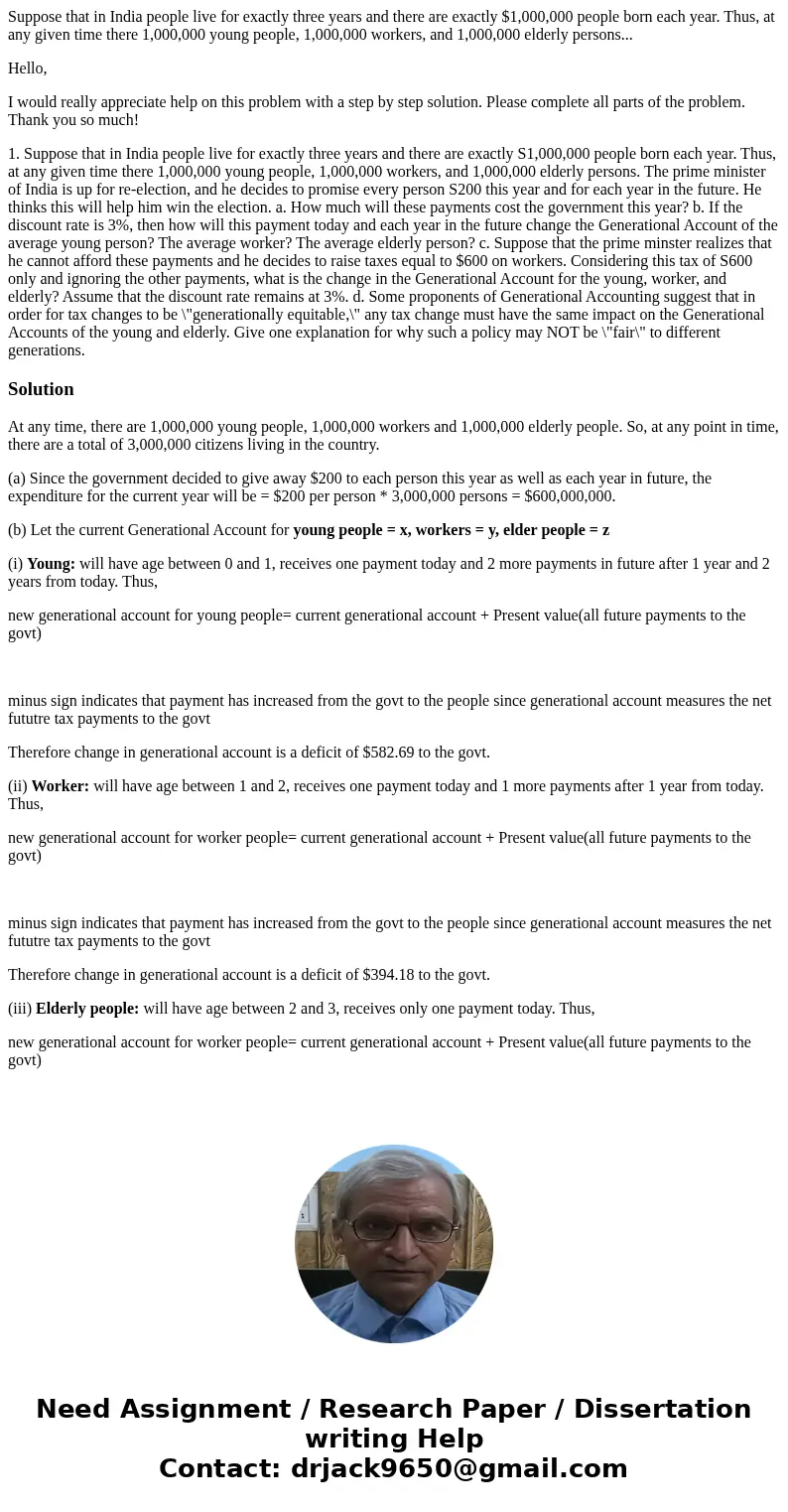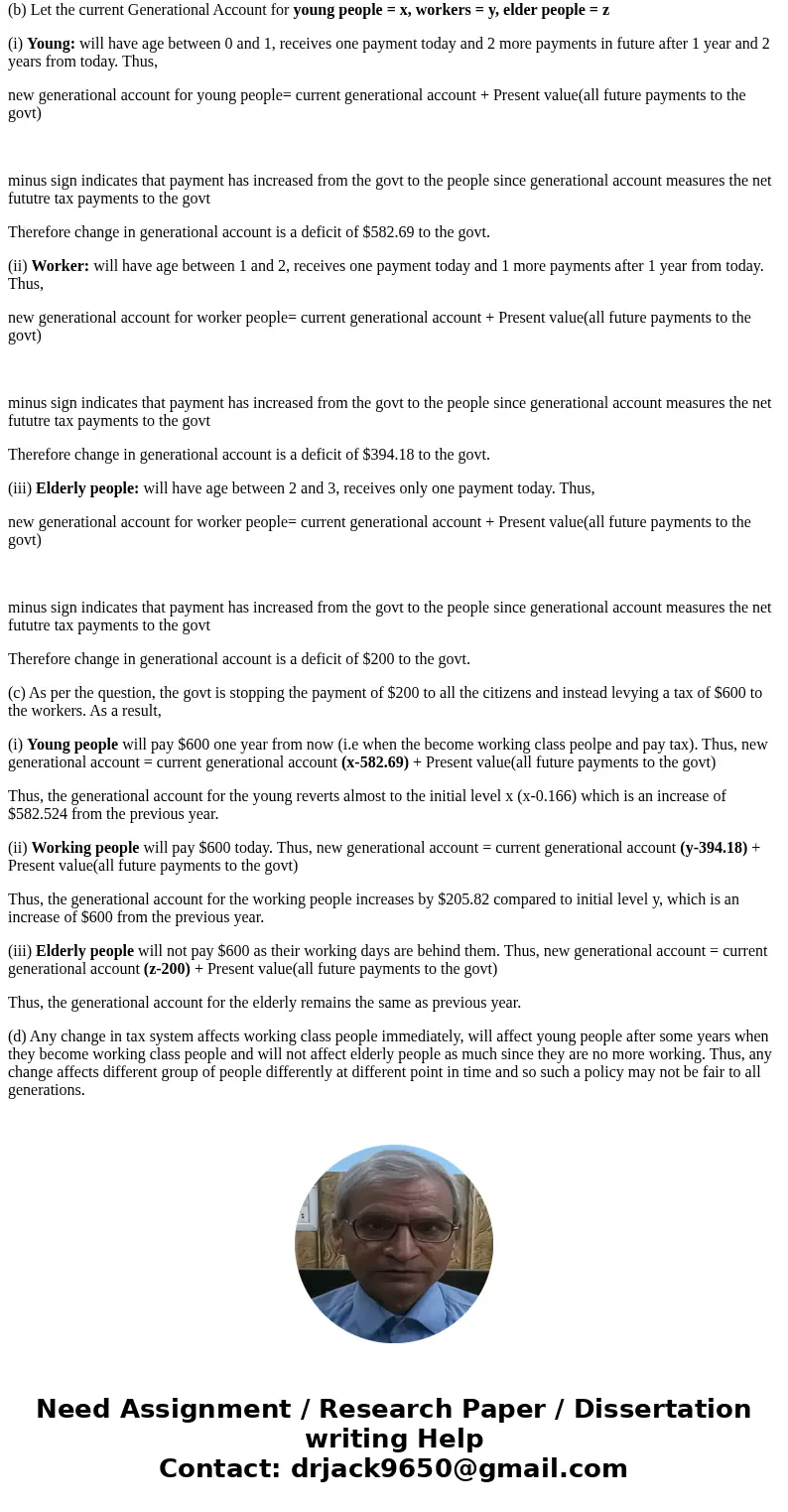Suppose that in India people live for exactly three years an
Suppose that in India people live for exactly three years and there are exactly $1,000,000 people born each year. Thus, at any given time there 1,000,000 young people, 1,000,000 workers, and 1,000,000 elderly persons...
Hello,
I would really appreciate help on this problem with a step by step solution. Please complete all parts of the problem. Thank you so much!
1. Suppose that in India people live for exactly three years and there are exactly S1,000,000 people born each year. Thus, at any given time there 1,000,000 young people, 1,000,000 workers, and 1,000,000 elderly persons. The prime minister of India is up for re-election, and he decides to promise every person S200 this year and for each year in the future. He thinks this will help him win the election. a. How much will these payments cost the government this year? b. If the discount rate is 3%, then how will this payment today and each year in the future change the Generational Account of the average young person? The average worker? The average elderly person? c. Suppose that the prime minster realizes that he cannot afford these payments and he decides to raise taxes equal to $600 on workers. Considering this tax of S600 only and ignoring the other payments, what is the change in the Generational Account for the young, worker, and elderly? Assume that the discount rate remains at 3%. d. Some proponents of Generational Accounting suggest that in order for tax changes to be \"generationally equitable,\" any tax change must have the same impact on the Generational Accounts of the young and elderly. Give one explanation for why such a policy may NOT be \"fair\" to different generations.Solution
At any time, there are 1,000,000 young people, 1,000,000 workers and 1,000,000 elderly people. So, at any point in time, there are a total of 3,000,000 citizens living in the country.
(a) Since the government decided to give away $200 to each person this year as well as each year in future, the expenditure for the current year will be = $200 per person * 3,000,000 persons = $600,000,000.
(b) Let the current Generational Account for young people = x, workers = y, elder people = z
(i) Young: will have age between 0 and 1, receives one payment today and 2 more payments in future after 1 year and 2 years from today. Thus,
new generational account for young people= current generational account + Present value(all future payments to the govt)
minus sign indicates that payment has increased from the govt to the people since generational account measures the net fututre tax payments to the govt
Therefore change in generational account is a deficit of $582.69 to the govt.
(ii) Worker: will have age between 1 and 2, receives one payment today and 1 more payments after 1 year from today. Thus,
new generational account for worker people= current generational account + Present value(all future payments to the govt)
minus sign indicates that payment has increased from the govt to the people since generational account measures the net fututre tax payments to the govt
Therefore change in generational account is a deficit of $394.18 to the govt.
(iii) Elderly people: will have age between 2 and 3, receives only one payment today. Thus,
new generational account for worker people= current generational account + Present value(all future payments to the govt)
minus sign indicates that payment has increased from the govt to the people since generational account measures the net fututre tax payments to the govt
Therefore change in generational account is a deficit of $200 to the govt.
(c) As per the question, the govt is stopping the payment of $200 to all the citizens and instead levying a tax of $600 to the workers. As a result,
(i) Young people will pay $600 one year from now (i.e when the become working class peolpe and pay tax). Thus, new generational account = current generational account (x-582.69) + Present value(all future payments to the govt)
Thus, the generational account for the young reverts almost to the initial level x (x-0.166) which is an increase of $582.524 from the previous year.
(ii) Working people will pay $600 today. Thus, new generational account = current generational account (y-394.18) + Present value(all future payments to the govt)
Thus, the generational account for the working people increases by $205.82 compared to initial level y, which is an increase of $600 from the previous year.
(iii) Elderly people will not pay $600 as their working days are behind them. Thus, new generational account = current generational account (z-200) + Present value(all future payments to the govt)
Thus, the generational account for the elderly remains the same as previous year.
(d) Any change in tax system affects working class people immediately, will affect young people after some years when they become working class people and will not affect elderly people as much since they are no more working. Thus, any change affects different group of people differently at different point in time and so such a policy may not be fair to all generations.


 Homework Sourse
Homework Sourse